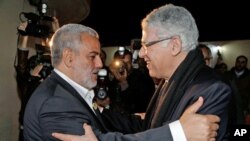Morocco has a new prime minister after a moderate Islamist party won the most seats in parliament. The new civilian leader said there will be no change to the kingdom's long-standing alliances with Western powers.
After years in opposition, Abdelilah Benkirane's Islamist Justice and Development Party - or PJD - won more than one-quarter of the seats in a new parliament, and is now moving to form a coalition government with three secular parties.
The former physics instructor, 59, is a veteran of Moroccan politics, joining the Muslim Youth Organization in 1976 before leaving to help found the more-moderate Islamic Group Organization, which eventually became the PJD party he now leads.
Appointed by King Mohammed VI to lead a new government this week, Benkirane said he intends to put the Moroccan people first.
The new prime minister said government today should be ready to serve its citizens. It is those voters who elected the party to parliament and gave it enough seats to form a government, so he said the focus on citizens is now paramount, and state officials should realize that they are here to serve them.
Benkirane's party is a strong defender of the monarchy's “divine right to rule” and backs a continuation of the king's religious, security, and military authority against protesters from a group known as the “February 20 movement” who want many of those direct powers reduced.
Benkirane said the February 20 Movement is a social movement that was established to bring about change, and many of those changes were made in a July referendum. As the group continues, he said he needs to know what they want now. If those demands are reasonable, he said it is natural that the government will agree to them. But if those demands are not clear or logical, then they will have to discuss how else to move forward.
The February 20 Movement demonstrations were sparked by the political upheaval across North Africa. Several of July's constitutional changes brought about by the Arab Spring directly benefit Benkirane.
Morocco's king could previously choose any prime minister he liked. He must now select the head of the party that won the most seats in parliament. Both the prime minister and parliament also gained some new authority.
Political observers here say the moderate nature of his party and its deference to the monarchy means Benkirane's government is likely to maintain Morocco's long-standing alliances with Europe and the United States.
The prime minister says it is unthinkable to dismantle Morocco's historic alliances with the West, which remain based on many mutual interests. He says Morocco's relationships with France, Spain, Britain and the United States will not change.
Benkirane's party doubled its seats in parliament, in part, because it campaigned on reducing corruption, reforming education, creating more jobs, and raising the minimum wage in a country where nearly one-third of young people are unemployed and nearly one-quarter of the population of 33 million live in poverty.
Determined to move ahead with that social agenda, Benkirane said he is realistic that no meaningful change can be achieved without the king's consent.
The prime minister said individual liberties are an internal matter between Moroccans that are regulated by law. Religion is the king's prerogative, not of the head of the government. He says Moroccans must not forget that this is a monarchy, and the head of state is the king, not the prime minister.
Turnout for last Friday's vote was only about 30 percent. Benkirane said he understands that the political situation is “very tense,” and he is promising a “strong government that will give hope to Moroccans.”
Morocco's New PM Vows to Continue Western Alliances




